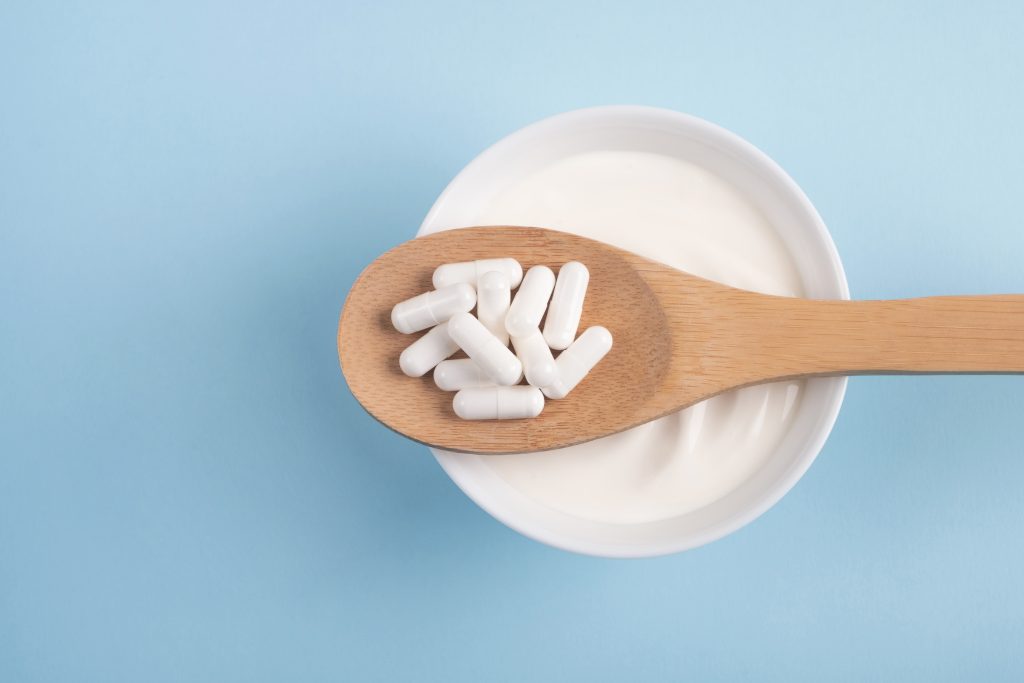April 22, 2022
7 Ways To Improve Your Gut Health
A healthy gut can help you maintain good overall health, as your gut is linked to many important bodily functions. For instance, improving gut health can help you enjoy better digestion.
Here’s more about why gut health is so important, along with seven ways to achieve better gut health.
Why Is Gut Health Important?
Your gut does far more than break down the foods you eat. It also absorbs vitamins, minerals, and other nutrients that keep your body healthy. It moves toxins and waste out of your body, and helps your immune system stay strong.
A healthy gut can help balance your hormones and contribute to clear, healthy-looking skin. It can even balance your mood and reduce your risk of depression, anxiety, and other mood disorders. A reduced risk of cancer and autoimmune diseases like lupus are other benefits of having a healthy gut.
If your gut isn’t in great shape, there are several gut health hacks you can practice to start feeling better. Signs of an unhealthy gut include an upset stomach, changes in weight, and insomnia. Skin problems, fatigue, and diarrhea after eating certain foods are other common signs of an unhealthy gut.
Your doctor can talk to you in more detail about improving your gut health and discuss available treatments.
What Are the 7 Best Ways To Restore Gut Health?
Restoring your gut health is possible with certain lifestyle changes. Your healthcare provider can help you implement some of these behaviors, including modifying your diet.
1. Eat More Probiotics
Probiotics are live bacteria that are good for your gut health. This “good” gut bacteria can restore a healthy balance in your gut. It can also destroy and reduce “bad” gut bacteria and cells that cause diseases. Some good gut bacteria may even produce vitamins and help you digest certain foods.
Yogurt is a probiotic that is relatively easy to find in grocery stores. When buying yogurt, stick to brands that lack added sugars. High-sugar foods can worsen your gut health. Use natural sweeteners like honey and fruits to improve the flavor of plain yogurt.
Kimchi, kefir, and kombucha are other foods that contain probiotics. If you have problems adding these foods to your diet, ask your doctor about supplementation. Probiotic supplements can also help you improve gut health.
2. Drink More Water
Water helps flush waste and toxins from your body. This allows your gut to stay clean and healthy. It can also contribute to regular bowel movements and reduce digestive problems like constipation.
Drink higher amounts of water to improve your gut health. Also, start drinking fewer sodas, energy drinks, and sugary fruit juices. Many of these drinks are high in sugar and can affect your gut health.
3. Eat Slowly
Eating and chewing foods slowly can help with digestion. Foods that are completely broken down can be digested more easily. This can help you avoid abdominal pain, bloating, and gas. Chewing foods thoroughly also allows your body to absorb more nutrients.
Turn off the television during mealtimes. Watching TV can distract you from eating and chewing slowly. Being mindful while eating can also help you avoid overeating.
4. Get Quality Sleep
 Lack of sleep and poor quality sleep can interrupt your body’s digestive processes. Poor sleep can also increase inflammation in the stomach to cause symptoms like constipation and bloating. It can even prevent you from having regular bowel movements.
Lack of sleep and poor quality sleep can interrupt your body’s digestive processes. Poor sleep can also increase inflammation in the stomach to cause symptoms like constipation and bloating. It can even prevent you from having regular bowel movements.
Aim to get at least seven hours of sleep every night. If your bed is uncomfortable, look into buying a new mattress or bedsheets to improve your sleep quality. A good night’s sleep can often resolve digestion problems.
5. Manage Stress
Chronic stress increases your body’s levels of a stress hormone called cortisol. High levels of cortisol can increase inflammation and damage your gut over time. Stress and anxiety can also cause you to experience diarrhea.
Find new ways to handle and reduce stress. Try exercising or meditating. Spend more time with your friends, relatives, and pets. Reducing stress also comes with many other health benefits, including lower blood pressure and a stronger immune system.
6. Avoid Smoking
Cigarettes and other nicotine products contain harmful chemicals. These chemicals can destroy healthy gut bacteria and increase bad gut bacteria. Smoking also contributes to inflammation. This increases your risk for cancer and inflammatory bowel disease (IBD).
If you’re a non-smoker, don’t start smoking. If you smoke and need help quitting, ask your doctor about smoking cessation treatments. Medications and nicotine replacement products are some of the many treatments that can help you quit smoking.
7. Change Your Diet
 Foods that are high in sugar or highly processed can lead to poor gut health. These foods can reduce the number of good bacteria in your gut. They can also interfere with your hormones and contribute to weight gain and poor mental health.
Foods that are high in sugar or highly processed can lead to poor gut health. These foods can reduce the number of good bacteria in your gut. They can also interfere with your hormones and contribute to weight gain and poor mental health.
Start eating a higher amount of healthy, whole foods. Fruits, vegetables, beans, nuts, lean meats, and fish are foods that can improve your digestion and gut health. These foods are also loaded with important nutrients.
If you need help changing your diet, ask your doctor for help. Your doctor may also refer you to a dietitian or nutritionist who can help you create a meal plan.
What Is the Best Way To Improve Gut Health?
The best way to improve your gut health is to work with your doctor.
Your doctor can identify the root cause of your gut problems. Your doctor can also talk to you about your lifestyle and brainstorm various changes you can make to get better gut health. In some instances, your doctor may order diagnostic tests to rule out other problems that may be causing your symptoms.
When To Seek Medical Attention
See your doctor right away if you have chronic or unusual stomach problems. Severe abdominal pain, nausea, vomiting, and diarrhea are digestive symptoms that can indicate a serious underlying health problem. You should also see your doctor if you continue to have gut problems after making the above healthy lifestyle changes.
Healthcare Associates of Texas is home to a large team of board-certified medical professionals who can work with you to improve your gut health. Click here to find your nearest location and request an appointment.
DISCLAIMER
The information featured in this site is general in nature. The site provides health information designed to complement your personal health management. It does not provide medical advice or health services and is not meant to replace professional advice or imply coverage of specific clinical services or products. The inclusion of links to other web sites does not imply any endorsement of the material on such websites.